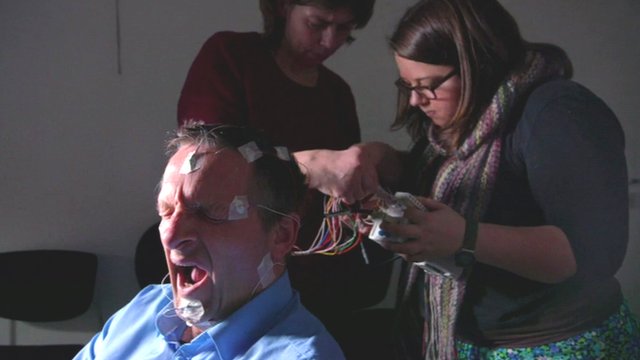当前位置: Language Tips> 双语新闻
How much can an extra hour's sleep change you?
 |
| Dr Michael Mosley takes part in a sleep study |
|
The average Briton gets six-and-a-half hours' sleep a night, according to the Sleep Council. Michael Mosley took part in an unusual experiment to see if this is enough. It has been known for some time that the amount of sleep people get has, on average, declined over the years. This has happened for a whole range of reasons, not least because we live in a culture where people are encouraged to think of sleep as a luxury - something you can easily cut back on. After all, that's what caffeine is for - to jolt you back into life. But while the average amount of sleep we are getting has fallen, rates of obesity and diabetes have soared. Could the two be connected? We wanted to see what the effect would be of increasing average sleep by just one hour. So we asked seven volunteers, who normally sleep anywhere between six and nine hours, to be studied at the University of Surrey's Sleep Research Centre. The volunteers were randomly allocated to two groups. One group was asked to sleep for six-and-a-half hours a night, the other got seven-and-a-half hours. After a week the researchers took blood tests and the volunteers were asked to switch sleep patterns. The group that had been sleeping six-and-a-half hours got an extra hour, the other group slept an hour less. While we were waiting to see what effect this would have, I went to the John Radcliffe hospital in Oxford to learn more about what actually happens when we sleep. In the Sleep Centre, they fitted me up with a portable electro-encephalograph, a device that measures brain wave activity. Then, feeling slightly ridiculous, I went home and had my seven-and-a-half hours of sleep. The following day I went to discuss what had happened inside my head during the night with Dr Katharina Wulff. The first thing she pointed out was that I had very rapidly fallen into a state of deep sleep. Deep sleep sounds restful, but during it our brains are actually working hard. One of the main things the brain is doing is moving memories from short-term storage into long-term storage, allowing us more short-term memory space for the next day. If you don't get adequate deep sleep then these memories will be lost. You might think: "I'll cut back during the week and then make up for it at the weekend." Unfortunately it doesn't work like that, because memories need to be consolidated within 24 hours of being formed. Since deep sleep is so important for consolidating memories it is a good idea if you are revising or perhaps taking an exam to make sure that you're getting a reasonable night's sleep. In one study, people who failed to do so did 40% worse than their contemporaries. Deep sleep only lasts for a few hours. My electrode results showed that during the night my brain went through multiple phases of another kind of activity, called REM sleep. "This is the phase when you are usually paralysed - so you can't move," Wulff explained. But the eye muscles are not paralysed, and that's why it's called rapid eye movement sleep." During REM sleep an extraordinary thing happens. One of the stress-related chemicals in the brain, noradrenalin, is switched off. It's the only time, day or night, this happens. It allows us to remain calm while our brains reprocess all the experiences of the day, helping us come to terms with particularly emotional events. We get more REM sleep in the last half of the night. Which means that if you are woken unexpectedly, your brain may not have dealt with all your emotions - which could leave you stressed and anxious. Drinking alcohol late at night is not a good idea as it reduces your REM sleep while it's being processed in your body. Back at the University of Surrey our sleep volunteers had finished their second week of the experiment. What we wanted to see was the effect switching from six-and-a-half hours to seven-and-a-half hours, or vice versa, would have on our volunteers. Computer tests revealed that most of them struggled with mental agility tasks when they had less sleep, but the most interesting results came from the blood tests that were run. Dr Simon Archer and his team at Surrey University were particularly interested in looking at the genes that were switched on or off in our volunteers by changes in the amount that we had made them sleep. "We found that overall there were around 500 genes that were affected," Archer explained. "Some which were going up, and some which were going down." What they discovered is that when the volunteers cut back from seven-and-a-half to six-and-a-half hours' sleep a night, genes that are associated with processes like inflammation, immune response and response to stress became more active. The team also saw increases in the activity of genes associated with diabetes and risk of cancer. The reverse happened when the volunteers added an hour of sleep. So the clear message from this experiment was that if you are getting less than seven hours' sleep a night and can alter your sleep habits, even just a little bit, it could make you healthier. "Have a lie-in, it will do you good" - that's the kind of health message that doesn't come along very often. |
据英国睡眠委员会(Sleep Council)调查显示,英国人平均每天只睡6.5小时。为了验证这样的睡眠是否足够,迈克尔·莫斯利医生(Michael Mosley)参加了一项不寻常的实验。 近些年来,人们已经认识到了这样的事实:我们的平均睡眠时间正在逐渐减少。 这一现象的原因是多方面的,其中之一便是我们所处的文化让我们觉得睡觉是件奢侈的事情,可以轻而易举地缩减。毕竟,咖啡因的功能就在这儿了:把你唤回清醒的状态。然而,随着睡眠量的不断下降,肥胖和糖尿病的发病率却在大幅升高——二者之间会不会有一定关系呢? 我们想看看把平均睡眠时间增加一小时会有什么效果,于是邀请了7位志愿者参加我们的实验。这7个人平日的睡眠在6—9个小时之间。实验由萨里大学(University of Surrey)的睡眠研究中心负责主持。 我们将志愿者随机分为两组,一组每晚睡6.5小时,另一组睡7.5小时。一周之后研究者对两组人的血液进行检测,并调换两组的睡眠量,原来睡6.5小时的一组多睡一小时,另一组则少睡一小时。 就在我们等待实验结果的过程中,我来到位于牛津的约翰·拉德克里夫医院(John Radcliffe hospital),看看我们睡觉时究竟发生了什么。 在该院的睡眠中心里,工作人员为我戴上一台便携式脑电图仪。就这样,我戴着仪器半觉好笑地回到家,睡了7.5个小时。 第二天,我来到医院,向卡塔琳娜·伍尔夫医生询问了我的情况。 首先,她指出我很快就进入了深睡眠。虽然听上去挺安详,大脑在深睡眠时其实在积极地工作,其中一件重要的事情便是将短期记忆转存到长期记忆中,从而为第二天的短期记忆腾出空间。如果睡得不够,一些短期记忆便会丢失。 你也许会想:“我在工作日里缩减睡眠,到周末再补上不就行了吗?” 遗憾的是,大脑的运行机制并非如此,因为记忆需要在最初形成的24小时内得到强化。 由于深睡眠对于强化记忆十分重要,复习和考试前睡够觉就很有必要。在一项研究中,那些在复习和考试前没能睡够觉的学生比同龄人表现差了40%。 深睡眠只能持续几个小时。我的脑电图显示,大脑在夜里经历了几个称为快速动眼睡眠(REM)的阶段。 “人处于这一阶段时通常是麻痹的,所以动不了。”伍尔夫解释道。但由于这时的眼部肌肉并未麻痹,因此这一阶段的睡眠称作“快速动眼睡眠”。 快速动眼睡眠时,我们的体内会发生一种奇特的变化:脑内的去甲肾上腺素(一种与压力有关的化学物质)会大量消失,使得我们能够在平静中对白天的经历进行再加工,从而更好地应对某些事件对我们造成的情绪影响。然而,无论黑夜还是白天,去甲肾上腺素只有在快速动眼睡眠中才能大量消失。 由于快速动眼睡眠更多地分布于后半夜,如果你在夜里突然醒来,大脑这时很有可能还没完全处理掉你的情绪,从而导致压力感和焦虑的产生。深夜饮酒可不是什么好事情,因为代谢酒精会缩短快速动眼睡眠的时间。 两周后,我们的睡眠志愿者们结束了实验。我们想看看,人在少睡一小时和多睡一小时时会有哪些变化。 计算机测试结果表明,少睡一个小时时,多数人在完成思维敏捷性的任务时显得力不从心。不过更有趣的还是血液的检测结果。 萨里大学的西蒙·阿彻博士和他的团队发现,睡眠时间的变化会影响基因的活跃程度。 “我们发现一共约有500个基因受到影响。”阿彻说。“有些变得更加活跃,有些则相反。” 他们发现,当志愿者的睡眠从7.5小时减少到6.5小时时,体内与炎症、免疫和应对压力相关的基因变得更加活跃,与糖尿病和癌症相关的基因也是如此。而当受试者的睡眠时间增加后,这些基因的活跃程度便减弱了。 因此,实验清楚地表明,对于那些睡不够7个小时的人而言,如果他们能够改变睡眠习惯,哪怕只是做出一点点改变,他们的身体都会变得更健康。“多睡会吧,对你有好处。”遗憾的是,这样的建议我们听到的太少了。 相关阅读 (译者 王道元 编辑 齐磊) |
上一篇 : 澳方就失联航班发表最新声明
下一篇 : 中美第一夫人的“时尚经”
关注和订阅


电话:8610-84883645
传真:8610-84883500
Email: languagetips@chinadaily.com.cn